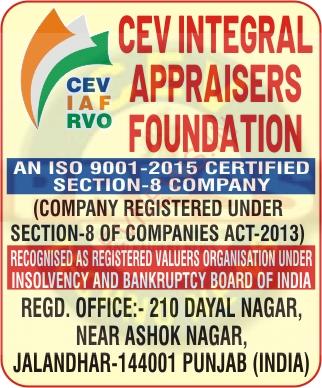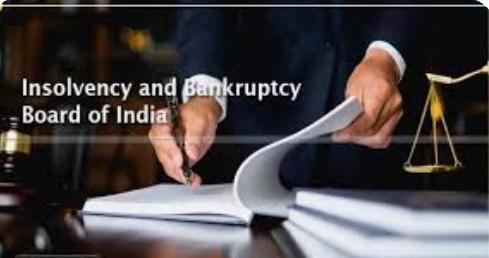“STRATEGY TO BE USED FOR SUCCESS IN THE IBBI EXAMINATION”
“HOW TO PREPARE, WRITE AND PASS THE VALUATION EXAMINATION”
Compiled By:-Dr. Rajwinder Singh Bansal & Er. Sundeep Bansal
INTRODUCTION
IBBI Valuation Examination is very interesting for technocrats like Civil, Mechanical, Electrical, Electronics & Other specified branches of Engineering, Architects & Town Planners as well as for accounts professionals like CEs, CSs, etc., and, in our view, and experience much more challenging than the GATE exam. The syllabus is also quite vast and there is no single book available in the market which covers all the topics at one place.
Most of the theory & MCQs books have been authored by people most of whom perhaps have not qualified the Exam. As a result, using the “download and copy-paste” strategy to bring out some material in the name of the book, many times irrelevant contents are published which instead of helping the aspirants, end up in wasting their precious time and causing avoidable disappointment.

STUDY MATERIAL FOR EXAMINATION
Does IBBI provide any study material for the examinations?
IBBI does not provide/recommend any study material or workbook for the examinations. You may use the books or other resources available on the subject. IBBI has put on its website some study material prepared by the RVOs. The same can be accessed at https://ibbi.gov.in/resources/ipa-rvo.
Based on our qualified & experienced faculty’s experience of preparing and passing this exam, we are happy to share here the strategy to prepare and pass the Valuation Exam, which worked for us quite well. And we hope this will also work for the readers of this article, who may use it with suitable changes from their side and emerge successful in passing this very interesting and useful Exam.
Is the Valuation Examination mandated under any law and for what purpose?
Yes. The Companies (Registered Valuers and Valuation) Rules, 2017 was notified on October 18, 2017. The Ministry of Corporate Affairs (MCA) has delegated the powers and functions pertaining to Registered Valuers, as mentioned in Section 247 of the Companies Act, 2013, to the IBBI, vide notification dated October 23, 2017). The Valuation Examination is mandated under Section 247 read with sections 458 and 469 of the Companies Act, 2013 (18 of 2013). It is one of the mandatory conditions for registration as a Registered Valuer with IBBI.
Personally, we found this Exam is very much interesting and useful and we would very strongly recommend this 50 Hours educational course under Rule 5(1) to be read with Rule 12(2)(a) to all Civil Engineers & Architects. We are sure, preparation itself, they will find quite interesting and refreshing. Completing an Exam like this and ID are some of the best refresher courses which all professionals can and should undertake. We have tried to answer the most encountered Frequently Asked Questions related to Valuation Examinations for the use of Land & buildings, Plant and Machinery & securities & Financial assets based on data available on IBBI official website of the authority (With effect from 1st July 2022)
ELIGIBILITY CRITERIA
Am I eligible to appear for the Valuation Examination? What is the eligibility criteria for writing the Valuation Examination?
The eligibility criteria as to the qualifications and experience required to write Valuation Examination is provided in the Companies (Registered Valuers and Valuation) Rules, 2017. The same can be accessed at https://ibbi.gov.in/legal-framework/rules.
I am not sure if I have relevant qualification/experience. Where can I know the validity of my degree as per the Rules?
All the details regarding valid qualifications and experience have been provided in the FAQs for registration. The same can be accessed at https://ibbi.gov.in/faqs . Any further clarifications can be sought from the Registered Valuers Division of the IBBI by writing to valuer@ibbi.gov.in .
Graduates with 5 years of post-qualification experience and post graduates with three years’ of post qualification are eligible to appear for the Exam. However, there is another requirement of prior completion of a mandatory 50 hours Class room training with a IBBI Recognised RVO.

MEMBERSHIP WITH RVO
When and how do I seek membership with RVO?
Any candidate who wishes to take up valuation examination will have to enrol himself/herself as a member of the Registered Valuer Organisation (RVO) registered with IBBI, subject to the eligibility criteria mentioned in the Rules, prior to taking up Valuation Examination. He should also have completed the mandatory 50 hours training provided by such RVO to become eligible for taking the examination. The Training Completion Certificate awarded on successful completion of the course will have to upload while enrolling for the examination. Details of RVOs are provided in IBBI website under the section Service Providers and is available at https://ibbi.gov.in/serviceprovider/valuer-organisations. Further, details in this regard are also available at https://ibbi.gov.in/faqs.
HOW TO REGISTER FOR THE EXAM?
Can you explain to me the entire process in short?
- Check the eligibility criteria to write exam
- Undergo a mandatory 50-hour educational course conducted by RVO.
- Enrol for Valuation Examination in specified asset class.
- Receive a Pass certificate after passing the Valuation Examination
- Registration as Registered valuer
- Seek primary membership with a Registered Valuers Organisation (RVO)
Can I directly register and enroll for the Valuation Examinations?
Yes. You may like to go through the step-by-step tutorial for registration and enrolment at https://certifications.nism.ac.in/nismaol/data/Registrations/Registration_Guidelines.pdf before proceeding for registration. There are three stages in the process and kindly follow instructions given on the screen at every stage:
Stage I: Registration with the system
Please visit https://ibbi.gov.in/examination/view-valuation-exam/19, click on the relevant asset class, and Click on Register/Enrol for Exam’ button. You will be taken to NISM Certifications Registration Portal. You are required to upload the following documents in jpeg/jpg format:
- Copy of PAN Card,
- Photograph,
- Proof of address
This is a one-time registration, and you will be provided with log-in credentials i.e., user ID and password. Thereafter, access the examination system with these credentials and manage all future activities like enrolment, slot selection, fee payment etc. Every candidate is requested to create a single user ID only and use the same for all purposes.
Stage II: Enrolment and slot selection
In order to enrol for a particular exam and time slot visit https://ibbi.gov.in/examination/viewvaluation-exam/19. Select relevant asset class, click on “Register/Enrol Online” link and access the system with user ID created in Stage I to choose the relevant asset class, examination centre, day, and the time when you would like to take the examination. Candidates will have to provide the details of RVO membership number, PDF copy of training completion certificate, GST number, if any, during the enrolment process. Examination fee of Rs.1770 online is required to be paid to complete the enrolment. Payment can be made using Credit Card / Debit Card / Net Banking. Once enrolment is complete, you can download your Admit Card for the examination.
Stage III: Taking the examination
Please carry a Printout of the Admit Card, original PAN Card/Aadhar Card/Passport and arrive 30 minutes before the scheduled time at the examination center. Please note that without the Admit Card and the Original Photo Identity proof (as mentioned above), candidates shall not be permitted to appear for the Examination.
If you do not pass the examination and wish to take the examination again, you need to repeat stage II and stage III, as many times as you wish.
ALL ABOUT EXAMINATION PROCEDURE & FREQUENCY
When are the examinations held?
The examinations are available on all days. To check the availability of date and time at the examination centre of your choice, please visit https://ibbi.gov.in/examination/view-valuationexam/19.
What is the fee payable for the examinations?
The prescribed fees for Limited Insolvency Examination, currently is Rs. 5000+Applicable GST i.e. Rs. 5900 (Rupees Five Thousand and Nine Hundred only) for every enrolment. It has to be paid during enrolment and can be paid using Debit Card / Net Banking / Credit Card. The payment gateway charges, if any, shall be borne by the candidates.
How many times I can take the examinations?
You can appear for the examination any number of times till you clear the exam. However, for appearing in exam 7 th September 2022 onwards, please be guided with IBBI Circular No. EXAM13016/2022-IBBI dated 6th June 2022 available on IBBI website at https://ibbi.gov.in/legalframework/circulars.
I want to reschedule my examination slot to a different date. How can I do it?
It may be noted that rescheduling is not permitted unless there is a bona-fide reason. All such requests must be addressed to the Test Administrator NISM at certification@nism.ac.in. Further, you may note that only those requests received 15 days prior to the date of examination will be considered. Therefore, the candidates are advised to carefully plan and schedule their examination.
What is the format of the Valuation Examination?
The examination is based on multiple choice questions which are to be answered within time period of 2 hours. The maximum score is 100. And 60% and above is considered successful. There is a negative marking of 25% for each wrong answer.
SYLLABUS FOR EXAMINATION
What is the syllabus for the examinations? How do I prepare for the examinations?
The examination is based on the syllabus notified by the IBBI on its website. Please visit https://ibbi.gov.in/examination/view-valuation-exam/19 and click on the relevant asset class to find out syllabus. All areas of the syllabus are covered in the examination and the candidate is expected to be thorough on every part of the syllabus.
Can I refer books or other material during the examinations?
No. It is not an open book examination. Candidates shall not carry any reading /reference material into the exam centre.
What is the structure of the question paper?
The question paper will have a total of 87 questions, out of which 74 questions will be of 1 mark each and 13 questions of 2 marks each. Questions include those based on case studies also. Each question paper is unique, derived by the system and hence is randomised and comprehensive in terms of coverage of the syllabus.
How can I get an idea of the structure of the question paper before the examinations?
A sample question paper for respective asset class is available at https://ibbi.gov.in/examination/view-valuation-exam/19
I got less questions than mentioned in the examinations. Kindly clarify.
There are 87 questions of which 13 questions are based on three case studies which appear as three cohesive groups of 6 questions, 4 questions and 3 questions respectively. As the computer system draws these questions based on case study as a set, these appear as a single question and the testing platform only displays the count of single questions attempted, but when the sub questions of the case study are taken into account, you would have received a total of 87 multiple-choice questions in your respective examination.

RESULT FOR EXAMINATION
How and when will I know my result?
Immediately on submission of the answer paper or expiry of two hours, whichever is earlier, a temporary mark sheet would be displayed on the computer screen indicating the marks you have scored in the examination. A score of 60 or more is considered as passing score. You will also receive a pass certificate from the IBBI.
When will I receive the pass certificate?
Successful candidates, those securing 60 marks or above, will be issued a certificate by the IBBI within 30 days of passing the examination. The pass certificate issued is based on the details as provided by the candidate at the time of registration in the examination portal. Candidates are therefore advised to exercise abundant caution while providing details at the time of registration.
MODIFICATION/ RECTIFICATION OF INCORRECT DETAILS
My pass certificate has incorrect details. What should I do to rectify them?
The pass certificates are issued based details as provided by the candidates at the time of registration in the examination portal. Request for change in details will not be entertained unless there is a bona-fide reason. The candidate has to do the following for the re-issue of a pass certificate:
- The pass certificate issued by the Examination Division must be returned in original.
- An affidavit, duly notarised, in respect of the changes sought along with self-attested copies of proof of identity, proof of address and the score card issued by the test administrator must be included.
- These may be sent to the Examination Division of IBBI.
The pass certificate will be re-issued within 30 days from the receipt of the above-mentioned documents for genuine request only.
RE-EVALUATION OF ANSWER PAPERS
Can I request for re-evaluation of my answer paper?
Candidate’s responses are checked by computer without any human intervention; hence no reevaluation is allowed. Subject to this, request/s received from a candidate for resolution of doubts about a question forming part of the examination will be considered as per the following policy:
- Candidate’s request/s will be considered only when he/she specifically mentions a particular question/s that he/she thinks to contain errors. Claim/s to recheck more than two questions shall not be permitted unless the substantive material is provided by the candidate as to why he/she considers errors in such questions.
- No request/s to disclose/discuss question/s and/or their answers shall be entertained as disclosure of the question/s will violate the integrity of the question bank, namely, breach the confidentiality/secrecy of the question bank.
- Only those request/s made on the spot (before leaving the test center) will be considered for verification.
- When a request is received from a candidate at the test center, it shall be forwarded by the respective Test Administrator to NISM.
- Such matter will then be escalated with the question/answer to the IBBI with the details of the nature of the error, the correct version of the question or contested correct answer, and the system recognized the correct answer. IBBI, after due diligence and proper scrutiny, will arrive at a conclusion whether the claim made by a candidate in relation to a question or answer is right.
- Score computation shall be carried out based on the approval as per point (e). Such score card will then be issued to the candidate by Test Administrator.
- The above policy and process will be subject to review from time to time and shall be binding and final in relation to any claim and/or matter when disposed of with the approval of the competent authority of IBBI.
CONSEQUENCES FOR INDULGING IN MALPRACTICE IN THE EXAMINATIONS
What are the consequences if a candidate indulges in malpractice in the examinations?
Any candidate found indulging in malpractice shall be debarred from taking any examination with IBBI, notwithstanding any other action that the Board may take.
CONTACT DETAILS FOR ANY CLARIFICATION ABOUT THE EXAMINATIONS
Whom should I contact for any clarification about the examinations?
For any clarification, you may send an e-mail to NISM at certification@nism.ac.in or you may call up NISM on number +91-8080806476 (09:30 hrs to 17:30 hrs) (Mondays to Fridays).
It’s our effort in this note to make it a comprehensive one on the subject so that you are able to get all the required info at one place. So let’s begin from the beginning and i.e. how to register for this Exam.
How to prepare for the Exam?
- As mentioned earlier, this Exam is not only very interesting but at the same time quite challenging. Besides, testing the knowledge, intelligence, experience, and level of expertise of the aspirants, it also tests their presence of mind. This Exam is interesting because this is not a typical pen & paper exam, which would involve subjectivity to some
- Rather, it is an online MCQ-based examination where your answer has to be an absolute plus, there is a negative marking of 0.25 marks for each 1 mark (0.50 for 2 Marks) question which is answered wrongly. Hence, one has to be absolutely meticulous in preparation for the exam as well as in writing the exam.
- This Exam has a very vast syllabus. IBBI has uploaded this syllabus on its website. With a view to helping the aspirants, We have presented here below inputs based on our preparation and experience of passing the Exam, highlighting the following three important aspects:
- What Book or material to refer to for every topic
- What should be your topic-wise approach to preparation finally
Degree of preparation required for each of the topics to help the participants do proper preparation management.
Degree of preparation is classified in three ways as follows:
- Average: This means you just need to be aware of this topic as it is quite simple and relatively
- High: This needs your attention and you should spend adequate time on this topic so as to be comfortable in answering the related
- Professional: Here, you have to prepare exhaustively well. Do not leave anything in option as regards these topics. Full preparation of these topics will not only help you in scoring good marks in answering theoretical MCQs, but also help you answer the Case Studies

STRATEGY TO BE USED FOR SUCCESS IN THE IBBI EXAMINATION
- In our experience, in passing the Valuation Exam, 75% depends on “how well you have prepared for it” and the remaining 25% depends on how well you tackle the actual Exam. And in OUR view, it is this 25% part that makes the real
- First of all, please remember, it is not important how many questions you attempt, what is important is, how many questions you answer correctly, as there is a negative marking of 0.25 marks for every wrong answer you give for a question of 1 mark. And this can be really
For example, let us say, you attempted all the questions in your attempt to somehow make it. And you answered questions worth 67 marks correctly and questions worth 33 marks wrongly.
So even though you got 7 more marks than required for passing the exam, you would still fail because, the 33 questions answered wrongly will eat 8.25 marks of your marks because of negative marking. As a consequence, your actual score will come down to 58.75 i.e. (67-8.25). What a pity, isn’t it?
- So how should you go about tackling the exam so as to avoid this mishap? Just follow the following strategy with whatever modifications you may feel
- To begin with, keep answering only those questions about which you are 100% sure that you know the correct answer. Follow the principle of “First time right”.
- If you are not sure about a question, “mark it for review”. But before doing so, click on the option which you think, should be the correct answer for this question. So that next time when you come back to it, you do not have to spend too much time on it again.
- And when you are sure about a question that, you definitely do not know the answer to it, just skip it. No need to spend time on it at all, either now or later.
- Now after completing the entire paper, following the above three steps, by clicking the review icon you will see in front of you:
- How many questions you have attempted about which you are absolutely sure in your own
- How many questions you have kept open for review and
- How many questions you have not attempted at all (these are the ones you are sure that you do not know the answer).
Now let us assume that the total no. of questions for which you are absolutely confident, is 64, which defac to means you are through. Therefore, you need not do anything. It is possible that you may have some surplus time, have a quick look on the questions “marked for review”, if something is found simple to answer, otherwise you can close the Exam, get the good news of passing it and go home with a smile on your face and result in your hand.
The second scenario, let’s say for example, you have answered 57 questions (or questions worth 55 marks) about which you are absolutely So now your task is to just ensure that out of the questions which you have marked for review, you are able to answer about 5-8 questions correctly, if it is more, so much better.
So, now read the question and the multiple choices very very carefully with total concentration and focus so as to be able to, use the logic of elimination of wrong options and thereby try and reach to the correct answer.
Please don’t try guesswork (tukka), it can be dangerous. Keep your head absolutely cool. And keep on working on it and I am sure, you will certainly reach the desired number and sail through the exam.
The total of questions is about 85 to 87 and not 100, as a few questions carry 2 marks each.
There are three Case Studies which are again based on the valuation techniques and will have 13 questions of 2 marks each.
Time is of absolute essence in this Exam, hence ensure that you do not get stuck up on any question, give a calculated time and move on.
One more suggestion which we would like to make is, even if you are not fully prepared at this moment, just schedule and appear for this exam at your earliest possible. This will help you in many
-
- Firstly, it will make you aware of the entire process of the exam and how you should play the above
- Secondly, it will make you realise, what kind of questions appear in the exam and
- Finally, it will make you realise, how well you are prepared and how much more preparation you still have to This will cost you Rs. 1500/- + GST extra, but I think this investment is definitely worth it.
- Please also remember some of the questions carry 2 marks whereas most of them carry 1 mark each. This you can see on your screen and answer the questions which carry 2 marks each with even greater care and awareness as wrong answer to such a question will eat 0.5 marks of your
For contacting the Valuation Examinations Division of IBBI, you may send an email to valuationexam@ibbi.gov.in
We hope this article will help you not only in preparing for the Insolvency Exam but also pass it successfully. I wish you Goodluck and grand success.

EXPERT OPINION OF A FEW SUCCESSFUL CANDIDATES
AS PER AR. GAURAV SACHDEVA-19TH BATCH
Hello Everyone
Thank you for your wishes.
A lot of you have been asking me for a strategy. So I would like to share it.
First of all the exam is very easy if you prepare properly.
I would suggest you –
1. Take out a printout of the syllabus first.
2. Start preparation of Chapters related to Valuation first. i.e. Chapter 8 as it carries 33 marks.
Just refer to Rajvinder sir’s book and Study every case Study given in his folder. In my both attempts I received every case study from that folder.
3. Then prepare Chapters 3, 5, 6, and 7. Make sure to tick mark every topic on the syllabus that you prepare.
4. Then Chapter 9, 10, 11.
5. Chapters 1, 2, and 4. as these chapters are not related to our field, you need to have a basic understanding of them to clear the exam.
Divide the whole syllabus into 10 – 15 days. Give the last 3 days a revision.
While attempting the exam-
1. Write numbers 1 to 77 on rough paper.
2. Firstly attempt only those questions that you are 100% sure about and tick mark them in the rough paper.
3. For any questions you are in doubt just mark it for a review.
4. Do not attempt any question for which you have no Idea.
5. After completing the exam once, go through every mark for the review question. Give them enough time to understand and answer.
This Strategy has worked for me very well and I hope this will work for you as well.
All the best. 👍🏻

AS PER ER. LAXMI NARSIMHA ANANTH-19TH BATCH
Golden Rules & Tips to Reduce Negative Marking in IBBI/IBC exams.
Just sharing what worked for me & My suggestions which you may find useful:
1. Be calm,
2. Remember to take deep breaths every few minutes.
3. Appear for these exams confidently & without getting worked up.
4. Nothing to worry.
5. Leave those questions that you don’t know.
6. Appear what you know the answers.
7. While preparation is one aspect, the real test of one’s knowledge and caliber is when one actually attempts the exam.
8. More than one’s knowledge base and intelligence, what comes into play is the candidate’s presence of mind and accuracy in attempting the questions which we know and our smartness in NOT attempting the ones we are not very sure of.
9. As per IBBI syllabus and format, students get 1 mark for a correct response and a quarter mark will be deducted for the wrong response, i.e. if you don’t attempt what you don’t know you lose only 1 mark, but if you make a wild guess and it turns out wrong, too bad for you. You just lost 1.25 marks, it is equal to losing 1 mark out of 4 correct answers, or 25% losses.
10. To our misfortune if you shoot in the dark for a two or a three-mark question God help you then!
11. Do not apply guesswork wildly, do not get anxious or lose your cool after the first hour or so when time starts running out.
12. Divide your time into 30-minute slots, and complete simple stuff which you already know in the first 30 minutes. (Total time 120 minutes). Go on & Complete all additional questions & answers which you know for sure in the next 15 minutes including revision of these.
13. Answer only those questions you have some inkling about and leave the questions you are completely unsure of.
14. Start with simpler questions first and eliminate stress.
15. Use the excel sheet or pen & paper to write down 1-100 or 1-80 and mark 1 mark, 0 marks or -.25 for each correct, unattempted or doubtful answer. After you achieve 60 marks try NOT to be rash & negligent. Don’t shoot in the dark at all now at any cost.
16. If on pen & paper using cumulative marks, and in excel auto sum to see how many marks you have in your pocket.
17. Help yourself by warming up your brain to prepare yourself for tough questions ahead.
18. Beginning with tough questions initially, leads to stress and causes you to mark wrong answers, even when you were actually well-versed with the subject and the answers.
19. Read your Qns twice, and underline in your mind words like NOT, except, only, etc, when faced with trick or double negative questions.
20. After reading the question, and seeing the first option, in over-excitement, do not mark any answer as your choice without reading the rest of the options.
21. Sometimes attempting a question you have a thorough knowledge of is the worst thing too. Many times ‘All of the above is also a correct response, which many students blatantly ignore.
22. Put all Case Studies & mathematical problems for the last 30-45 minutes and work on them at the end and choose the nearest correct answer.
23. Use Excel or Open Office for calculations.
24. Use mnemonics and linking methods of memory skills for your non-core specialization subjects.
25. These are the few things that worked for me to succeed.
Wishing all friends and brother/sister valuers all the best for their future exams.

FEW IMPORTANT TIPS & STRATEGIES HELPFUL FOR CLEARING THE IBBI VALUATION EXAMINATION SHARED BY ONE OF OUR WELLWISHERS VR. NILESH SUCHDEV
After looking at the results of several of my friends, and out of my own experience, I have devised this strategy for attempting MCQs of IBBI, which almost never fails:
1. Attempt all the MCQs for which you are sure
2. Calculate the score. If you are getting 65 or more, you may press submit, no need to attempt the doubtful ones (keeping margin for negative marking for answers you thought correct)
3. If you are scoring less than 65, you need to attempt more questions, even at the risk of negative marking
4. So go to each un-attempted question. Look at the probable answers, or eliminate surely wrong answers, whichever works for you.
5. If you have eliminated two and are left with two, go ahead and choose any one. In the long run, even after negative marks, you may benefit.
6. If you have eliminated only one, and there are three probably correct answers, re-read the question. Probably you know the answer, but the question is posed in a negative manner, which you have missed, and understanding the question well, the one answer you eliminated is actually the correct answer. If so, go ahead, and attempt. If not, and you are damn sure you can only eliminate one answer, you may skip this question.
7. After you are done, re-evaluate your score. If you are above 70 (this time, 65 will not suffice, since there is a higher probability of wrong answers). If not, you still need to take higher risk… and so on and so forth, till you are sure of clearing the test…
If not, you still need to take a higher risk… and so on and so forth, till you are sure of clearing the test…
Hope this helps.
CLICK BELOW FOR MORE DETAILS ABOUT
HOW TO REGISTER AND ENROLL FOR NISM CERTIFICATION EXAMINATION AND CPE PROGRAM ONLINE

FOR MANY MORE UPDATES AVAILABLE CLICK BELOW
CLICK THE BELOW LINK TO READ THE COMPLETE CONTENTS
KIND ATTENTION
We are going to close all what’s groups of CEV soon due to difficulties in posting information or message in more than 5 groups of CEV at a time.
All future posts of empanelment notices & professional importance will be shared on
1. https://t.me/+dbHNkNO22xsyYTY1
2. www.valuerworld.com
3. The Twitter handle of CEV India
https://twitter.com/cevindia?t=XbqlvnwUVz1G3uPgs749ww&s=09
after closing the groups.
All members of these groups are requested to register themselves at the following link immediately for Getting all related timely updates.


